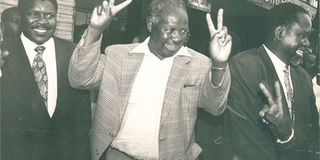Matiba farewell: Let’s examine sins of the past to fix our future

From left: Chris Bichage, veteran politician Kenneth Matiba and Raila Odinga during a meeting to push for multiparty democracy in Kenya in the early in 1990s. PHOTO | FILE | NATION MEDIA GROUP
What you need to know:
- It took the sacrifices of Mr Matiba and so many others for us to win the freedoms that we today take for granted.
- Today, those who actively opposed the struggle for multi-partism call the shots.
- The situation today is like a mirror image of what happened at Independence, when President Jomo Kenyatta betrayed the freedom fighters and constituted an administration dominated for homeguards and other traitors, torturers and loyalists of the colonial regime.
The final farewell for multi-party campaign pioneer Kenneth Matiba has re-opened plenty of discussion on the roles played by different individuals at a pivotal time in Kenya’s evolution from one-party dictatorship to democratic governance.
Mr Matiba’s role has been revisited in detail, together with other heroes of the multi-party campaign, who, starting in 1990, bravely challenged the brutal police state of President Daniel arap Moi’s Kanu regime.
It took the sacrifices of Mr Matiba and so many others for us to win the freedoms that we today take for granted.
Some key points of discussion have, of course, revolved around the roles played by individuals and political movements and how and why the promised revolution was thwarted by ethnic infighting.
FENCE-SITTERS
Of course, also under discussion is how the fence-sitters and Johnny-come-lately to the fight for democracy, or outright reactionaries and supporters of the one-party dictatorship, became the real beneficiaries of the new dispensation while those who led the struggle were shunted aside.
The situation today is like a mirror image of what happened at Independence, when President Jomo Kenyatta betrayed the freedom fighters and constituted an administration dominated for homeguards and other traitors, torturers and loyalists of the colonial regime.
Today, those who actively opposed the struggle for multi-partyism, those who served the tyrannical order, oversaw or supported the killings and torture and grew fat and rich from looting of the public wealth, call the shots.
REGIME
It is under such a regime that those in power preach ‘forget the past’ — not out of piety and the spirit of healing and forgiveness but only because they do not want their own sins revisited or the sources of their ill-gotten wealth examined.
The best tribute we can pay to Mr Matiba is to abandon self-serving amnesia and engage in an honest examination of our past. Unless we openly and honestly look back, we will never acknowledge our failures and shortcomings so that we can begin on the path of healing, closure, forgiveness, redemption and reconciliation.
We all know that Mr Matiba suffered a stroke while detained without trial, which contributed to diminished responsibilities and collapse of a fabled business empire.
His going to court and winning compensation was all well and good. We can pin ultimate responsibility on an inanimate creature called ‘The State’ and assign political blame on then-President Moi. But below the president there were maybe dozens of officials who committed gross abuses instead of having the gonads to defy illegitimate orders.
SACRED CALLING
Which government doctor betrayed his sacred calling by heartlessly denying Mr Matiba medication despite knowing that he was at serious risk of a stroke? Would the Medical Practitioners and Dentists Board seek answers?
Which security minister, police chief, prison commander and other officials were complicit in Mr Matiba’s detention and maltreatment? Should they be identified and called to individual account?
This is about more than Mr Matiba. We may pin political responsibility on President Jomo Kenyatta for the assassinations of Pio Gama Pinto, Tom Mboya and J. M. Kariuki; and on President Moi for the killing of Dr Robert Ouko. But we also need to call to account the individual officials who executed the dastardly acts.
JUSTICE
Personally, I would want to see brought to justice the Kenya Prisons Service chiefs at headquarters and at Kamiti and Naivasha prisons, who were directly responsible for the 1988 killing of my University of Nairobi Design Department classmate Tito Adungosi.
I use the term ‘killing’ very deliberately for, while we are told that he died from a stomach ulcer, I know that my comrade would not have bled to a slow and painful death unless deliberately and maliciously denied very simple medical treatment.
OLD WOUNDS
Now, don’t get me wrong. This is not about needless opening of old wounds. It’s not about seeking revenge and retribution. It’s about honestly confronting our past and exorcising the demons, so that we can start anew on a fresh path not held back by unanswered questions.
I’m sure Adungosi’s family would be ready to forgive the killers of their son and brother. But they cannot do that unless they first know whom to forgive; unless there is confession and acknowledgment of a crime and a request for forgiveness.
[email protected] Twitter: @MachariaGaitho





